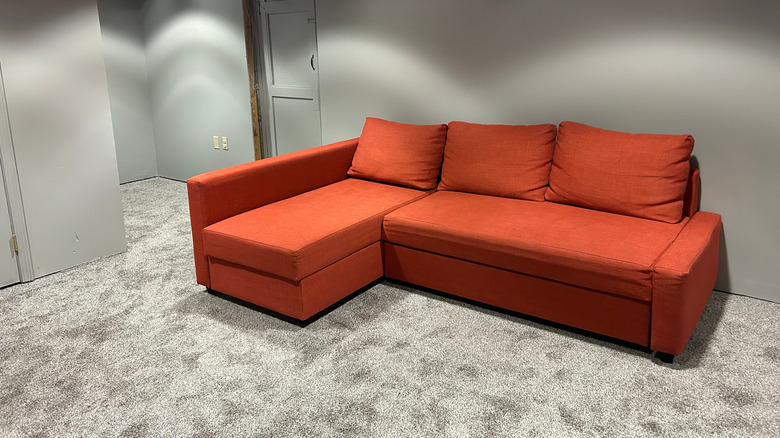The Best Carpet Flooring For Your Basement (And The Type To Avoid)
Making decisions about installing flooring in the basement requires considering several factors, such as comfort, how the space will be used, and environmental conditions. If you have determined that carpet is the best choice, you will need to choose the right type of carpet for that area of your house and know which types to avoid. Basements are prone to moisture and humidity, so the level of dampness should be a top consideration.
There are several sources of possible moisture in the basement. You could have groundwater seeping in, especially if your home is in a low-lying area. Other sources of moisture in the basement include appliances or pipes leaking, high humidity levels, and the basement getting wet during heavy rains. A synthetic fiber carpet that is water resistant and stain resistant is the best option for a carpet that can withstand both moisture and normal wear and tear, especially if the basement gets a lot of traffic.
Selecting the best carpet for your basement
When choosing carpet for your basement, consider the best types of fibers and carpet pile. A carpet with synthetic fibers is better able to stand up to moisture and resists mold and mildew better than one with natural fibers. Nylon, Olefin (polypropylene), and polyester are synthetic fibers that are water resistant, mold- and mildew-resistant, and durable.
Other features to look for in basement carpet include pile height, waterproof backing, and carpet padding. A low pile or cut pile carpet is best for basements because the lower pile means the carpet will absorb less moisture and dry out faster, if it ever does get wet. A carpet with a waterproof backing will help with moisture resistance. Padding is important on basement floors, as the carpet is usually laid over concrete. Synthetic padding will provide the desired comfort while resisting moisture.
If you are planning a DIY basement renovation and want a budget-friendly carpet that is easy to install, you may want to consider carpet tiles. The advantages of using carpet tiles in the basement include affordability and ease of installation. Carpet tiles are less expensive than traditional wall-to-wall carpeting. In addition, the tiles are sometimes peel-and-stick and always come with an attached backing, so they are quick and easy to install, which saves even more money.
Carpets to avoid in basements
While it is safe to install carpet flooring in the basement, it is important to choose the right type of flooring and take steps to address moisture concerns. Before installing any carpet, any cracks in the concrete floor will need to be sealed. This will help prevent moisture from seeping up from the ground through the cracks in the concrete.
But this doesn't mean you should go for just about any carpet. A type of carpet to avoid in the basement is any carpet made of natural or organic fibers. Although many people love the idea of using natural materials in their homes, the basement is not the place for this type of carpet. Natural fibers are more absorbent, which is not great when moisture is a concern. In addition, natural fibers are more prone to mold and mildew growth when they get wet.
As with carpet fibers, stay away from natural padding materials, such as jute. This material is more likely to deteriorate in humid environments compared with synthetic padding. When you choose water-resistant carpet and take steps to reduce moisture, for example, ensuring sufficient ventilation and using a dehumidifier, you will enjoy a durable carpet that warms your basement living area.


